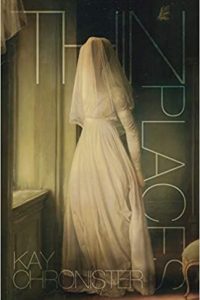Your Shadow Half Remains by Sunny Moraine: Review by Gabino Iglesias
 Your Shadow Half Remains, Sunny Moraine (Nightfire 978-1-25089-220-1, $16.99, 176pp, tp) February 2024.
Your Shadow Half Remains, Sunny Moraine (Nightfire 978-1-25089-220-1, $16.99, 176pp, tp) February 2024.
If you look at someone, you’re dead. Not just dead, but dead in some horrible, violent way. That’s the premise at the core of Sunny Moraine’s Your Shadow Half Remains. Yes, readers familiar with Josh Malerman’s Bird Box may see a similarity to that novel in that premise, but Your Shadow Half Remains is very different, and Moraine’s lyrical prose and unique characters make this book shine.
Riley lives alone and hasn’t looked at another person’s face in many years, not even her own or faces in pictures. A strange disease that turns people into hyperviolent savages with nothing but murder on their minds has, in many ways, ended the world as we know it. Scientists are still learning about the disease, and Riley stopped checking the news a long time ago, but she knows the basics: You get sick by looking at someone else. Riley’s isolated life has kept her safe, but when a new neighbor, a young woman named Ellis, moves in down the road from her house and pays Riley a visit, her years of isolation and need for human contact make her want to speak to this new woman despite the danger. Ignoring her own instincts, Riley reciprocates the visits and, in a slow, strange way, tries to establish a relationship with Ellis even while fear and anxiety make communication, and just being in Ellis’s presence, very difficult. As the relationship between the two women grows, they get more careless, and Riley wants to take off her blinders and look at her neighbor.
Your Shadow Half Remains is the kind of postapocalyptic narrative that eschews most of the big-picture/world-level stuff in favor of a more focused, intimate, and nuanced look at a single character. In this case, Riley is the perfect character for that. Scared, constantly worried, and used to being alone, she struggles a lot to accept Ellis’s presence and then with talking to her and learning to trust a stranger. Riley is constantly worried and aware of what one look could mean, but something inside here craves that look. As her psyche deteriorates and her grip on reality becomes slippery, the defense mechanisms she’s relied on for a very long time begin to fail, and even knowledge of the disastrous consequences isn’t enough to get Riley to stay at home and forget about Ellis.
The macrocosm of this novel works really well. Between Riley and Ellis’s houses, the path between them, and a bit of the surrounding woods, the narrative feels small even if we get some details about how everything is broken in the rest of the world. Slowly but steadily, the reduced space, while open, begins to feel claustrophobic, and as Riley’s grasp on reality starts to falter and her desire to look at Ellis increases, the tension occupies all the spaces other elements like characters or different locations would occupy. The end result is an intimate novel that quickly morphs into a character study of a crumbling psyche in the secluded aftermath of an apocalypse.
While the snowballing tension and awkward dynamic between Riley and Ellis make Your Shadow Half Remains an enjoyable read, the element that takes it to the next level is Moraine’s prose. Simultaneously sharp, fast, and elegant, the writing in this book keeps you turning the pages as it drags you deep into the main character’s brain and the bizarre relationship she develops with Ellis. Moraine has written a postapocalyptic narrative that’s not about the end of the world; it’s about the brutal effects of loneliness, and that makes it a must read.
Gabino Iglesias is a writer, journalist, professor, and book reviewer living in Austin TX. He is the author of Zero Saints and Coyote Songs and the editor of Both Sides. His work has been nominated to the Bram Stoker and Locus Awards and won the Wonderland Book Award for Best Novel in 2019. His short stories have appeared in a plethora of anthologies and his non-fiction has appeared in the New York Times, the Los Angeles Times, and CrimeReads. His work has been published in five languages, optioned for film, and praised by authors as diverse as Roxane Gay, David Joy, Jerry Stahl, and Meg Gardiner. His reviews appear regularly in places like NPR, Publishers Weekly, the San Francisco Chronicle, Criminal Element, Mystery Tribune, Vol. 1 Brooklyn, the Los Angeles Review of Books, and other print and online venues. He’s been a juror for the Shirley Jackson Awards twice and has judged the PANK Big Book Contest, the Splatterpunk Awards, and the Newfound Prose Prize. He teaches creative writing at Southern New Hampshire University’s online MFA program. You can find him on Twitter at @Gabino_Iglesias.
This review and more like it in the September 2024 issue of Locus.
 While you are here, please take a moment to support Locus with a one-time or recurring donation. We rely on reader donations to keep the magazine and site going, and would like to keep the site paywall free, but WE NEED YOUR FINANCIAL SUPPORT to continue quality coverage of the science fiction and fantasy field.
While you are here, please take a moment to support Locus with a one-time or recurring donation. We rely on reader donations to keep the magazine and site going, and would like to keep the site paywall free, but WE NEED YOUR FINANCIAL SUPPORT to continue quality coverage of the science fiction and fantasy field.
©Locus Magazine. Copyrighted material may not be republished without permission of LSFF.







